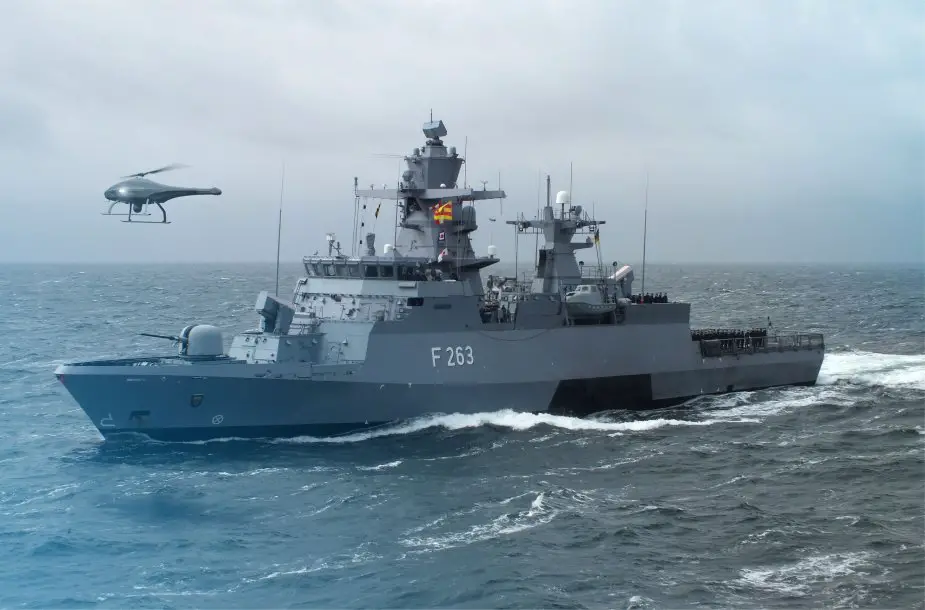According to a press release published by ESG on November 8, 2021, the Federal Office of Bundeswehr Equipment, Information Technology and In-Service Support (BAAINBw) has concluded a contract with ESG Elektroniksystem- und Logistik-GmbH as the main contractor for the procurement of three Unmanned Aircraft Systems (UAS), introduced in the Bundeswehr under the name "Sea Falcon", for the K130 corvettes of the German Navy.
Follow Navy Recognition on Google News at this link
 Sea Falcon Unmanned Aircraft System and Braunschweig-class corvette Oldenburg (Picture source: ESG Elektroniksystem- und Logistik-GmbH)
Sea Falcon Unmanned Aircraft System and Braunschweig-class corvette Oldenburg (Picture source: ESG Elektroniksystem- und Logistik-GmbH)
With the implementation of the project "Reconnaissance and Identification in the Maritime Operational Area (AImEG)", the corvettes' capabilities for imaging reconnaissance will be significantly expanded: in the future, objects can be detected and identified with the Sea Falcon far beyond the on-board sensor system.
One UAS consists of two Skeldar V-200 unmanned aerial vehicles, a ground control station integrated on the corvette from which the aircraft is controlled, and equipment with tools and spare parts.
The Sea Falcon is based on the type Skeldar V-200 from the Swedish manufacturer UMS Skeldar AB and can operate for up to 5 hours with a maximum take-off weight of 235kg, a maximum speed of 75 knots, and a payload of up to 40kg. It can take off and land automatically on the deck of the corvette in up to 20 knots of wind speed and "Sea State 3". An integrated sensor transmits real-time optical and infrared images to the ground control station.
The AImEG project, which has now been contracted, comprises over a period of 4 years
* in the pilot phase, the development and certification with regard to the adaptation requirements of the German Armed Forces; the delivery of one UAS including integration into a corvette; initial training of the German Armed Forces personnel as well as comprehensive logistic services;
* in the series production phase, the delivery of two further systems, one of which will also be integrated into a corvette and the other used for land-based training. In addition, three armament sets will be delivered for the future pre-fitting of further corvettes to accommodate a UAS.
A special feature within the scope of the adaptation developments is the extension of the so-called "safety-critical chain" with further functionalities, which will be concluded with military approval. The safety-critical chain ensures that the aircraft cannot leave an intended area of operation.
In the AImEG project, ESG assumes overall responsibility on the industry side as a general contractor and in-service support company. The overall service is provided in cooperation with ESG´s highly committed industrial partners of ESG: UMS Skeldar AB as manufacturer and supplier of the aircraft, NVL B.V. & Co. KG (formerly Fr. Lürssen Werft GmbH & Co. KG) as the manufacturer of the corvette and UAS integrator, and CUONICS GmbH as the aviation electronics parts developer and manufacturer.
The German Navy Braunschweig class corvettes (K130) were designed and built by the Class 130 Consortium led by Blohm + Voss. Five built ships have the primary task of surveillance, reconnaissance, surface target engagement, humanitarian missions, countering asymmetric threats, and operating mainly in the littorals.
The platform features an x-shape RCS-reducing hull with significant IR-suppression measures with no funnels and hot spots and sea-water injection in horizontal exhaust ducts complemented by a sophisticated Integrated Monitoring and Control System (IMCS) with over 7000 measuring points.
The contract for the first five ships was awarded in December 2001 Blohm+Voss, at that time owned by ThyssenKrupp Marine Systems, Nordseewerke, and Friedrich Lurssen Werft. The first ship, the Braunschweig, built at Blohm+Voss, was launched in April 2006 and was commissioned in April 2008.



